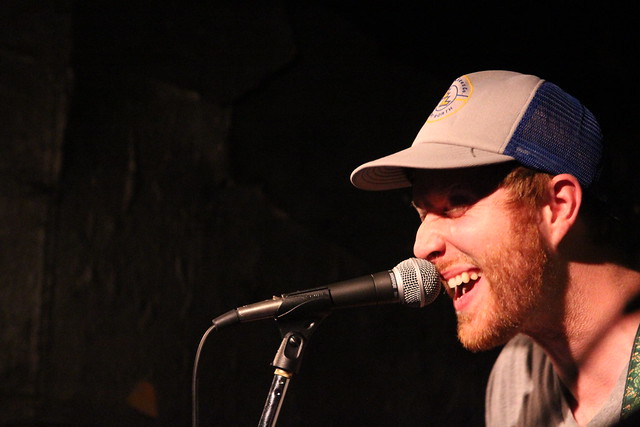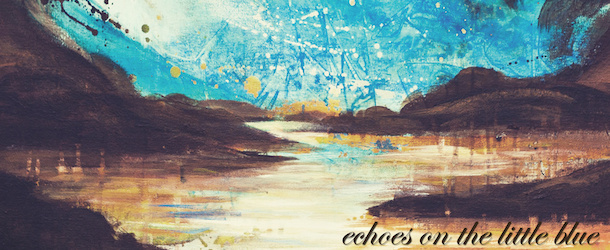Superficially, The Big Deep’s recording process for their second album probably sounds more like a vacation than a struggle for efficiency: spend a long weekend camping on bassist Jared Bakewell’s family farm, Possum Valley, where the nearest town of Endicott hosts fewer than 200 people. Cook out, relax on the sandbars of the Little Blue River, flowing low in drought-recovery, play music in a picturesque 107-year-old barn.
Echoes on the Little Blue will be released this Friday. That same day, the band will play a show at the Waiting Room with Rock Paper Dynamite and Michael Wunder and the Uninspired. On Saturday The Big Deep plays with Eli Mardock, who mixed Echoes, and The Allendales at Vega in Lincoln.
These shows were booked before tracking on the album began over the course of one weekend in September.
“There was a sense of urgency. There was a lot of focus to make sure we got it done on time,” Bakewell said. “It created some sense of rawness that I like to hear in recorded music. I think it affected the final product in a positive way.”
Compared to The Big Deep’s first effort, 2012’s Roman Empire, that rawness manifests itself in a looser, more confident sound for the Omaha roots rock band.
Bakewell said the band recorded Roman Empire over the course of a year, laying down tracks in a basement studio here and there, when they found the time. With the experience of one record under their belts, the pressure of looming deadlines, and a time frame fully dedicated to the goal, The Big Deep emerged from Possum Valley with Gasaway more comfortable in his own vocal attributes, the instrumentals more aware of their space.
Roman Empire is the work of a band emulating its own influences — Uncle Tupelo, Johnny Cash — perhaps afraid to take a breath for lack of personal faith. Echoes on the Little Blue finds reassurance in the band’s experience. Gasaway owns his lyrics, his ear for a memorable melody. Bob Reynolds’ guitar work steps outside of the alternative country framework and further into psychedelia, while the rhythm section plays as much of a guiding role as an underlying base on which the songs build.
“Coming out of [the first record], we had a lot of confidence to where we could control the process more and use what we’ve learned to have the freedom to make what we wanted to make,” Gasaway said. “You learn how to make a record by making a record.”
Bakewell attributes at least some of that evolution to the band’s circumstances at Possum Valley.
“A lot of people do their best work when they’ve got a great idea, great people, some great resources and not quite enough time. If you give yourself too much time to evaluate things, you overthink it.”
There’s a thin border between the inspired rush of an upcoming deadline and a very real shortage of time. Keyboardist Tregan Albers, whose brother Trenton plays drums in the band, remembers hanging out with Reynolds on the river, waiting for their turns to track.
“I’m losing my mind, drawing spirals in the sand,” he said. “Wondering if I’m going to have time to record, or not going to record.”
And while the aura of Possum Valley may lend authenticity to the album’s folk tendencies in its chirping crickets and percussive pitchforks, there are also the very real struggles of recording in a barn. The band balanced tight recording schedules while maintaining a campsite, cooking meals over fires and outfitting a building made for storing livestock and hay into one fit to record a professional album — including hauling amps and monitors up narrow stairs into the hayloft. And on their last day at Possum Valley, it rained.
“When we were done, everyone pretty much had had it,” Tregan said.
Gasaway calls the reality in which Echoes and members of The Big Deep exist, roots rock rooted in rural culture, their best hope at connecting with an audience. The idea of authenticity underlies Bakewell and Gasaway’s comments on industry pop music’s tendency to package and sell a certain image.
“Authenticity is your friend when you’re on a budget,” Gasaway said. “You’ve got to make it real.”
In some way, that’s what The Big Deep wants to peddle with Echoes: this is a record (at least partly) from a barn made by a few people with legitimate connections to that part of the country.
“People are interested in people and hearing experiences,” Gasaway said, “and we want that to come through above anything else.”
Why else, then, would the group lay bare in pieces the circumstances of Echoes?
Four short videos they’re calling album trailers have been released as a way to foster a greater connection with the project between the band and its audience. One shows Trenton finding his rhythm on the pitchfork. The most recent installment offers a behind-the-scenes look at Possum Valley as a music video for “A Beast. A Bullet. A Baby.” from Echoes. Another finds Gasaway discussing writing songs for the record, while “What is Possum Valley?” features Bakewell discussing his own connection to the farm.
The series seems like a push for a clever way to sell the idea of The Big Deep, to build a buzz in the weeks leading up to the release of Echoes. And quite probably it is, but in The Big Deep’s control, effective marketing and commitment to a total concept are not mutually exclusive.
“If we tell that story right and help people understand what they’re hearing, it’s going to make them appreciate it more and enjoy what we’ve created,” Gasaway said.
As an attempt at connecting audiences with the band’s experience, it might also be an effort to highlight the meticulous care with which the band pieced together Echoes, with much of the album tracked at Possum Valley, more guitar and vocal parts recorded at Music Factory Productions in Omaha, and Tregan’s keys recorded on a baby grand piano at Bakewell’s parents’ home.
Transparency keeps all that work from being taken for granted, that is, it’s a way to show the care with which The Big Deep produced Echoes, efforts that might go unnoticed in the recordings themselves.
The songs on Echoes have been written and arranged by the band in the years since Roman Empire, and for the most part, each new song found a place on the record.
“We vet our songs pretty heavily before they’re even brought before the band,” Gasaway said. “Everyone’s time is pretty valuable.”
Bakewell said the band is usually open to Gasaway’s songs, and that it’s rare the singer would bring a half-baked idea to them.
“When Nate brings in a song, it’s probably made it through a bunch of other ideas that didn’t make the cut.”
In that way, Echoes slowly developed until the Possum Valley sessions. From there, the album begins to take shape.
Gasaway said something as seemingly simple as deciding the album’s track order and what kind of sound bridges would be best between each song was an arduous process for the band.
“We spent a lot of time, which I hope comes through, assembling the songs in an order that it was meant to be listened to front to back,” he said. “It’s a complete collection of songs, not just individual tracks put together.”
While the tracks on the album have been in The Big Deep’s live repertoire for much longer than the inception of Echoes, the concept was never totally nailed down until the final moments. Gasaway says that in art, especially collaborative art, you have to be open to inevitable evolution.
“A painter can start working on a painting, and with a few brush strokes can take it to a darker or lighter place. Everybody’s got to own the song and everyone paints with a different brush.”
In the collaborative process, Bakewell said that not every person gets the specific things they want, but the result is always a product the quintet can be excited about.
Structuring the album, the band tries to strike a dynamic balance influenced primarily by the live music experience, where heavier, more progressive songs and poppier tracks are given equal consideration. With Echoes, they hope to create a whole musical experience.

Nate Gasaway at Lincoln Calling 2013 | photo by Chloe Ekberg
To be sure — regarding the barn, the trailers released in advance of Echoes, Gasaway’s blend of pop-minded melodies and alt-country twang — for The Big Deep it’s nothing if not deliberate. It all funnels toward the same end: making the most complete, enjoyable album they can.
“At minimum, I’m excited to present it to my friends and family and say ‘This is the best that I can do.’ This record is part of me,” Bakewell said.
The stress of Possum Valley, the anxiously idle hours between laying down tracks, the natural rawness and atmosphere The Big Deep hopes to capture on record, all of these extra ambitions could easily be considered unnecessary by another band. But without them, Echoes on the Little Blue may very well fail at connecting audiences with the band’s intentions.
“This is a record for listening to outside, under the stars. We want people to feel that, even if they’re listening to it in their living room,” Gasaway said.
Jacob Zlomke is Hear Nebraska’s staff writer. "Echoes on the Little Blue" reminds him of camping on muddy river banks. Reach him at jacobz@hearnebraska.org.




